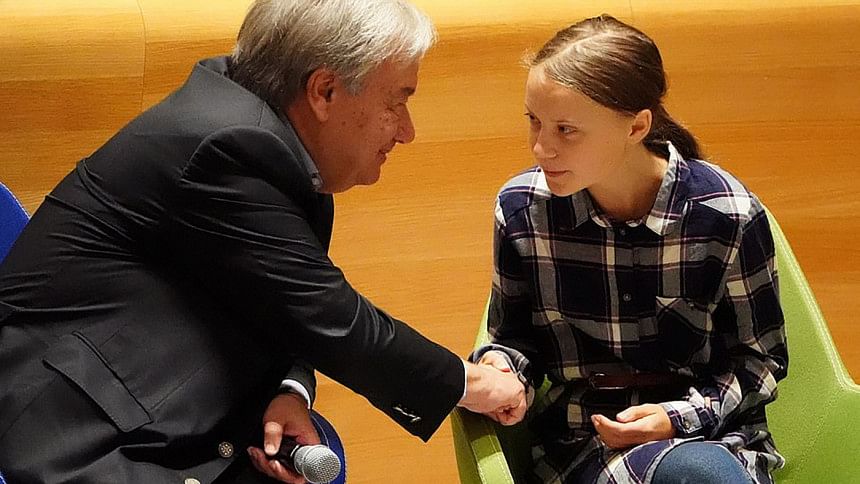The challenge from Greta Thunberg on tackling climate change

Last week in New York, the United Nations Secretary General (UNSG) Antonia Guitteres held a Global Action Summit where he invited world leaders from selected countries only to come with "plans not speeches" to raise the level of ambition to tackle climate change. Bangladesh Prime Minister Sheikh Hasina was amongst those invited but US President Trump was not (although he did turn up at the UN building that day to hold a separate meeting on religious freedom).
There were also many other related events held in the UN and around New York City. One of these events was the launching of the Year of Action of the Global Commission on Adaptation (GCA) where the Bangladesh prime minister also spoke. This was hosted by the prime minister of the Netherlands who will host an adaptation summit in the Netherlands in October 2020 at the end of the year of action.
Another series of events were held in the Central Park Zoo in New York on nature-based solutions which is an emerging area of developing economies while protecting the environment at the same time.
However, despite all these events and the important talks delivered by the great and the good, the most electrifying intervention was a short four-minute passionate speech by the 16-year-old Swedish teenager, Greta Thunberg, whose words, "How Dare You!", to the leaders, rang out with absolute clarity about the complete inadequacy of the efforts that the leaders were touting.
She has been able to completely turn around the terms of the debate concerning tackling climate change, from just a problem which we can tackle by taking incremental actions (and congratulate ourselves for doing so), to an emergency (she likens it to a house on fire!) which requires immediate and urgent action and which the leaders are all failing to deliver.
She is absolutely correct, as the world's scientific community have been saying for many years, that the actions being promised, even by the most progressive leaders, are completely inadequate compared to the scale of the climate crisis.
The other game-changing actions that took place on the two Fridays at the beginning and end of the Climate Action Week were the massive marches by school children around the world, with around four million marching on September 20, and over six million marching on September 27. Greta Thunberg led the first march in New York on the first Friday (where I was able to join with many colleagues from Bangladesh) and then she led the second march in Montreal where more than a million people marched in Canada. It was by far the biggest global march ever held.
In my view, this constitutes a significant shift in the global dynamic on tackling climate change from relying on leaders (who have largely failed us) to the people, and indeed to the children of the world who will now be taking the lead.
It is still unclear how this shift in dynamic will unfold but a few channels are becoming clear.
The first is the identification of the role of the fossil fuel companies who knew about the adverse impacts of their pollution, but instead of taking action to deal with the problem, did their best to prevent actions and continued to profit from their pollution. They were even able to influence governments to prevent them from taking action.
This nefarious act is now being recognised and many people, led by the Extinction Rebellion, are attacking the companies through peaceful protests around the world. Lawsuits are also being initiated against some of the companies in different countries.
These companies now need to be held responsible for the loss and damage that was caused by them and this will be an issue in the upcoming COP25 negotiations under the United Nations Framework Convention on Climate Change (UNFCCC) in Santiago, Chile in December.
The final aspect of the shift that I predict we will start to see much more of, is that individuals around the world will stop relying on their leaders (although continuing to urge leaders to act) only and will start to take action to tackle the problem themselves.
The country and people of Bangladesh represent a good example of this whole-of-society approach of tackling climate change, from the prime minister and government to NGOs , academia and private sector and media all taking the necessary actions by themselves, as well as collective actions to ensure that Bangladesh transitions from being the most vulnerable country to becoming the most resilient one.
Saleemul Huq is Director, International Centre for Climate Change and Development (ICCCAD) at the Independent University, Bangladesh.
Email: [email protected]

 For all latest news, follow The Daily Star's Google News channel.
For all latest news, follow The Daily Star's Google News channel. 



Comments